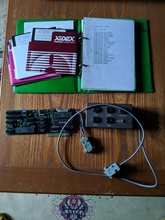| Attachment | Size |
|---|---|
| 207.67 KB | |
| 253.72 KB | |
| 240.07 KB |
Hi,
after years of searching, i have finally found a nearly complete Greengate DS:3 Synthesizer (missing the keyboard) for the Apple II.
I will make images from the disks and scan the manual, as soon as the card arrives.




The chip with the marking 862130 has some intersting text on the underside ;-)
ASIC.JPG
I can't read French, but if this thing uses regular old-school 9600 baud serial MIDI, then you ought to be able to use about any MIDI controller for the keyboard, assuming you can make the right cables.
So is this card a sampler, a synthesizer, or both?
Looks like he was trying to scratch out Korea. (for whatever reason)
[quote=Lee Adamson]
I can't read French, but if this thing uses regular old-school 9600 baud serial MIDI, then you ought to be able to use about any MIDI controller for the keyboard, assuming you can make the right cables.
So is this card a sampler, a synthesizer, or both?
[/quote]
The midi feature is missing on this card. It was available as an addon card.
The card shown offers 4 sampler channels with 15khz/8bit. There is a 16pin header that allowed the direct interfacing of a musical keyboard. The main feature is the ability to sample directly from an analog source via the audio in with 30khz/8bit. Each sample could be several Kilobytes long (at least long enough to sample the word 'panties' :-) ). I havent been able to play with the card just yet since im missing the actual software. The previous owner had left it in the disk drive of the A2 but is sending it to me in the next days.
-Jonas
DS3 manual applications guide.pdf
DS3 manual keyboard guide.pdf
DS3 manual users guide.pdf
My current data for the Greengate DS:3 on archive org.
https://archive.org/download/greengate_ds3/greengate%20DS-3/
Warning: the link in the previous post contains a virus. Do not click!
This refers to a deleted post. - Tom
That's a fantastic find, congrats. I don't suppose anyone has ever found a way to reproduce that ASIC(?)
It looks more like the part numbers on the component were sanded off to prevent cloning the board. If it was truly a proprietary chip, that wouldn't be necessary as the company would control all supplies of that chip. So sanded chips are never proprietary and always commodity parts. Could be a DSP. Ferranti ULAs (mask gate arrays) were available in 40-pin DIPs but why sand a chip that you control supplies of?
The ADC and the DACs are the Ferranti chips. ZN448 is an 8-bit ADC and the 4x ZN428 are 8-bit DACs.
That makes sense. Maybe a microcontroller too. Has anyone made a schematic for that card? should be doable if that front layout in the archive is accurate
You can almost see the PA and PB ports of the VIA going directly to the sanded chip. Did anyone read all those manuals and know what the IDC connector above the VIA is for? That could be a clue. Are the samples stored in the Apple, or does it keep them in board RAM (easier to vary pitch/speed that way).
You're correct, all sixteen PA and PB lines go to the IDC connector, which has to be for the keyboard. I read that it's supposed to work just like a regular computer keyboard, so I'm sure that PA and PB form a simple X and Y matrix for up to 64 keyswitches.
Here's part of how the unknown chip seems to be connected. The address lines are connected to the Apple II bus with bidirectional transceivers, and it generates its own R/W signal, so it seems to be capable of doing DMA. I think it's gotta be a microcontroller. Anyone familiar with this pinout?
Screen Shot 2023-03-25 at 1.10.00 AM.png
I checked some possible chips like the NS32008, AM2901, AM2910, Ferranti ULA, but they don't have VCC and Gnd on those pins.
Maybe the chip is a DMA controller or CRTC? It would need to be able to emit addresses onto the bus if samples are stored in Apple memory.
The mystery chip seems to be a MC6844 DMA controller (based on a post on Facebook from Bea Thurman).
405757449_1753969018453417_5086255745785628082_n.jpg
Can't see the facebook link, but Eric "TubeTime" Schlaepfer has released his clone, https://github.com/schlae/goodgreat-ds3